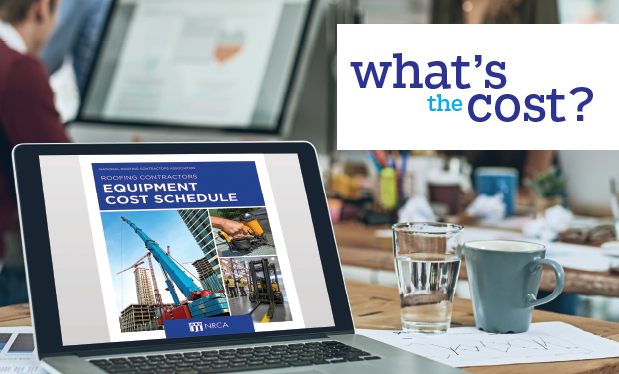NIOSH releases fact sheet to help employers combat opioid crisis
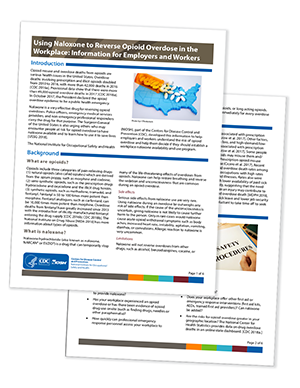
|
The National Institute for Occupational Safety and Health (NIOSH), which is part of the Centers for Disease Control and Prevention (CDC), has made available a new resource for employers and workers affected by the opioid crisis—"Using Naloxone to Reverse Opioid Overdose in the Workplace: Information for Employers and Workers," a fact sheet for workplaces considering implementation of a naloxone program, according to www.cdc.gov. Opioid misuse and overdose deaths are a public health crisis affecting many U.S. workplaces, including the construction industry.
According to 2017 data from CDC's National Center for Health Statistics, about 115 Americans die every day from opioid overdoses. Workplaces increasingly are becoming places where overdoses are occurring—the Bureau of Labor Statistics found overdose deaths at work from nonmedical use of drugs and alcohol increased at least 38 percent annually between 2013 and 2016.
Naloxone is a drug that can reverse many of the life-threatening effects of an opioid overdose. The NIOSH fact sheet offers a series of steps for an employer to consider when deciding whether his or her workplace should establish a naloxone program, making the overdose reversal medication available in the event an employee overdoses.
"With overdose events increasing in the workplace, having naloxone available can provide a tool that workplaces can use, along with first aid measures to support breathing, to provide aid in the event of an opioid overdose while waiting on first responders to arrive on the scene," says John Howard, NIOSH's director. "NIOSH developed this fact sheet to help employers decide if having naloxone available is right for their workplace."
The fact sheet provides an overview of opioids and naloxone; a series of questions for employers and workers to consider when looking at whether a naloxone program in their workplaces is appropriate; and information about resources needed to implement and maintain such a program.
NIOSH developed this resource as part of its broader effort to confront the opioid crisis. Providing resources for workers, employers and occupational safety and health professionals to help them learn about the opioid crisis, including data, field investigations and research, is an important component of the effort.
California construction workers face new limits on wage claims
On Sept. 19, California Gov. Jerry Brown signed Assembly Bill 1654 requiring construction workers who belong to unions to use their collective bargaining agreement grievance and arbitration procedure to address wage disputes and other employment matters, according to Bloomberg BNA.
Workers no longer can bring wage disputes to the courts by filing suit under California's Private Attorneys General Act (PAGA). Enacted in 2004, PAGA allows individuals to sue over breaches of California labor law instead of relying on the state to act.
During a Senate floor analysis of Assembly Bill 1654, the California Conference of Carpenters argued PAGA is good for nonunion workers but can undermine the protection a union contract offers workers.
The Consumer Attorneys of California opposed the bill, as well as the northern California and central California chapters of the Associated Builders and Contractors. During the Senate floor analysis, the Consumer Attorneys of California argued the bill would prevent workers from bringing a PAGA action against wage abuses.
"Before now, no employer or industry was spared from the watchful and protective eye of PAGA because all employees were potential enforcers of California's basic wage protections," the group said.
Construction union workers are not precluded from pursuing other civil actions against an employer for violations of the California Fair Employment and Housing Act, Title VII of the Civil Rights Act, or other discrimination or harassment. In addition, the workers' union contract must specifically provide a grievance and arbitration process and expressly waive the PAGA requirements in clear language.
Average wage for U.S. construction workers exceeds $30 per hour
The Bureau of Labor Statistics reported the average hourly wage for U.S. construction workers increased to $30.18 in September—3.1 percent higher than the average hourly construction wage in September 2017, according to www.constructiondive.com. An Associated General Contractors (AGC) of America analysis says this is the first time average construction wages for U.S. workers have exceeded $30 per hour. The hourly construction wage now is 10.7 percent higher than the average wage for workers in all other private nonfarm industries.
Construction employment increased by 23,000 jobs in September, including 18,600 jobs in the nonresidential sector. However, AGC of America officials have said the number of qualified workers is decreasing and warned pay increases may not be enough for construction employers to adequately staff their projects. The construction unemployment rate was only 4.1 percent in September—the lowest since 2000.
A recent AGC of America-Autodesk survey reported 62 percent of industry respondents said their firms had increased hourly pay for craft workers, and 25 percent said they offered incentive and bonus pay. An additional 25 percent said their companies improved employee benefit programs, and only 11 percent reported their firms had no plans to increase pay and/or benefits soon.
Executive pay and managerial-level pay also are increasing because of the labor shortage. In April, an Engineering News-Record analysis of industry compensation data revealed these salaries increased 4 percent between 2013 and 2017.
Professional Roofing's website redesign receives an honorable mention
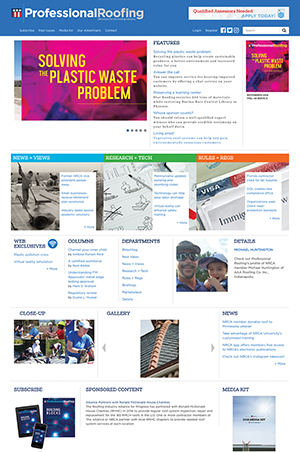
|
NRCA is proud to announce Professional Roofing magazine's website redesign received an honorable mention for the 2018 Folio: Eddie and Ozzie Awards. Professional Roofing launched its redesigned website, www.professionalroofing.net, in January.
The Folio: Eddie and Ozzie Awards is the most prestigious and inclusive awards program in the publishing community. Each year, more than 2,000 entries compete across more than 200 categories benchmarking editorial and design excellence.
Winners and honorable mentions were announced Oct. 9 at a celebratory gala during The Folio: Show in New York City.
Suicide prevention alliance offers free flyers and posters
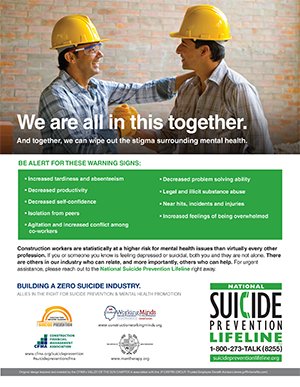
|
As part of its commitment to safety in the roofing industry, NRCA is a member of the Construction Industry Alliance for Suicide Prevention, a group of industry organizations committed to promoting the safety and well-being of construction workers. The Construction Industry Alliance for Suicide Prevention offers resources on its website, including published articles, frequently asked questions, mental health screening, and information and tips regarding how to plan an education session or suicide-prevention summit. Part of NRCA's membership commitment involves periodically sharing the association's suicide-prevention resources.
One resource intended to increase employees' awareness of mental health challenges and available resources is free flyers and posters that can be printed and displayed in workplaces. Featuring statements such as "Suicidal employees are only invisible if no one is looking" and "We are all in this together," the flyers and posters highlight the importance of paying attention to co-workers' behaviors and help combat the stigma surrounding mental health by promoting compassion toward those who may be struggling. Available in English and Spanish, the flyers and posters also feature construction suicide statistics, a list of warning signs and contact information for the National Suicide Prevention Lifeline.
Industry employers are encouraged to take advantage of the flyers and posters and the Construction Industry Alliance for Suicide Prevention's other resources, which are in place to help ensure any individual who may need mental health assistance receives the support he or she needs. The flyers, posters and additional resources are available at www.preventconstructionsuicide.com.
Tecta America to be acquired by Altas Partners
Altas Partners, a Toronto-based long-term private equity firm, has agreed to buy Tecta America Corp., a commercial roofing contractor based in Rosemont, Ill., according to www.pehub.com. Terms were not released for the deal, which is expected to close during the fourth quarter.
Tecta America will be sold by ONCAP, the midmarket division of Canadian private equity firm Onex Corp. ONCAP acquired Tecta America from Oaktree Capital Management two years ago for $280 million. ONCAP reportedly invested $124 million in the deal.
Created in 2000 with the merger of 10 roofing companies, Tecta America currently has more than 60 locations. The company provides roof system installation, replacement, repairs and maintenance and other roofing services to a variety of U.S. industries and end markets.
Mark Santacrose, president and CEO of Tecta America, said Altas Partners will help the company execute growth opportunities.
Altas Partner David Brent said Tecta America is an "excellent fit" with the investor's long-term strategy.
Altas Partners was founded in 2012 to make control-stake investments in hard-to-replicate businesses and hold them indefinitely. Tecta America is the firm's third platform deal in 2018.
Former NRCA board member passes away
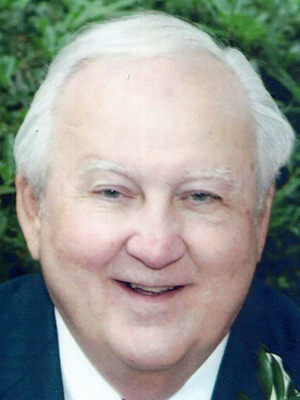 Dahill |
James L. Dahill Sr., a former NRCA board member and uncle of former NRCA President Jamie McAdam, passed away Oct. 26. He was 86.
After earning a bachelor's degree in business administration from the University of Miami, Dahill joined his family working at F. J. Dahill Co. Inc., New Haven, Conn. He enjoyed conducting roofing business and served as the company's president until his retirement. Dahill was active within several roofing associations, serving on the board of directors for NRCA, the Connecticut Roofing Contractors Association and the North/East Roofing Contractors Association (NERCA). Dahill was NERCA's president from 1985-88 and received the association's Clarence Carr Award in 1990 in recognition of his service.
Dahill is survived by his wife, Patricia; his sister, Mary Ann; his children, Brenden, Brian, Geoffrey, James Jr. and Kristin; his stepchildren, Dair, Deborah, Michael, Pamela, Royse, Steven and Troy; and several grandchildren and great-grandchildren. He was preceded in death by his parents, Frank and Helen, and his brother, Harrold. Donations in Dahill's name may be made to the Northeast Roofing Educational Foundation, 100 Grossman Drive, Suite 300, Braintree, MA 02184.
Mother of former NRCA president passes away
 Daly |
Beverly Louise Daly, mother of former NRCA President Bob Daly, passed away Oct. 26. She was 90.
A lifelong resident of the Kansas City, Mo., area, Daly held a bachelor's degree in education from the University of Missouri. She married Pat Daly in 1950, and together they raised six children, including Bob Daly, president of Kaw Roofing & Sheet Metal Inc., Kansas City, who served as NRCA president from 2007-08. She also volunteered at St. Joseph Medical Center in Kansas City for 25 years.
Daly is survived by her children, Bob, Donna, John, Maggie, Nancy and Steve; her sisters-in-law, Kathleen and Peggy; 15 grandchildren; and 11 great-grandchildren. She was preceded in death by her parents, Ethyl and George; her husband, Pat; her brother, Van; her son-in-law, Cliff; and her grandson, Michael. Donations in Daly's name may be made to the Michael Daly Memorial Fund, 9129 W. 126th Terrace, Overland Park, KS 66213, or Catholic Charities at www.catholiccharities.net.
General Coatings Manufacturing joins NRCA's One Voice initiative

|
General Coatings Manufacturing Corp., Fresno, Calif., is the most recent company to join NRCA's One Voice initiative.
The One Voice initiative is a transformational approach to addressing the roofing industry's most critical issues and concerns—with one voice—to secure its future. The campaign aims to collectively recognize threats to the industry and the opportunities they may present.
Additional information about NRCA's One Voice initiative, including a list of the 27 current One Voice partner members, is available by clicking here.



